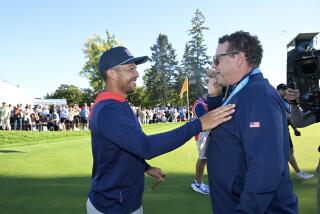U.S. Men’s Wipeout Complete
- Share via
SYDNEY, Australia — The last man standing, our own Gen. Custer, took the final bullet for the U.S. men’s Olympic tennis team Friday.
The moment, documented by the two U.S. sportswriters in attendance, occurred at 7:01 p.m., local time. Argentina’s Mariano Zabaleta, a muscular 22-year-old, hit yet another baseline rocket wide to the backhand side of his opponent, an aging, balding street fighter. Jeff Tarango, 32, fighting to the end, made one last lunge and got only a piece of the ball, which floated harmlessly wide of the sideline.
As the small and vocal group of Argentines in the stands stomped and hooted and sang their country’s song, the scoreboard pushed the dagger deeper in the hearts of U.S. men’s tennis: Zabaleta over Tarango, 6-2, 6-3, in 1 hour 6 minutes.
The last man standing had fallen.
In the stands, a distinguished-looking, white-haired woman named Judy Levering, who had watched throughout in understandable horror, smiled thinly at her husband, Gordan, and packed up to leave. This was not the legacy she had hoped for, nor even considered for one moment, when she took the job as president of the United States Tennis Assn.
But little did she know that nationalism and love of country usually stop near the front gates of the men’s tennis tour. She should have known better, been more prepared, but who would have ever thought that the men’s team, from the richest, most-active tennis country in the world, would end up taking its last gasp with Tarango, a journeyman who always gives it his all but frequently falls short.
The story of the men’s team is well known by now among those in the U.S. who are passionate about tennis in the Olympics. Pete Sampras, probably the best player in history and still with a year or two left of his prime, said all along that he wouldn’t beat up his body with yet another major event, Olympics or not. Then Andre Agassi, the defending champion, found out that both his mother and sister have breast cancer and he, understandably, declined.
After that, it got more than a little goofy. A resurgent Michael Chang was a logical pick, as was veteran Todd Martin. But Jan Michael-Gambill, a promising 23-year-old, actually turned down a spot and that opened the door for spots to go to Tarango, No. 77 in the world, and Vince Spadea, No. 156. Spadea entered the event with a 2-24 record in 2000, making Tarango’s 10-20 look almost imposing.
There was actually some hope that this band of underdog warriors could pull something off. But quickly, Martin, probably the best hope, was gone in a 6-2, 6-0 wink of an eye, followed by Spadea and Chang. And when the doubles team of Alex O’Brien and Jared Palmer, seeded second and considered a lock for some sort of medal, went out in a flash to a team from the Bahamas on Friday morning, it was left to Tarango.
So desperate was the situation that thinking positive got way out of control. After the doubles loss Friday morning, the USTA public relations manager, Randy Walker, actually used the word “medal” in the same sentence with the word “Tarango.” Walker also said that the gold-medal match was scheduled for the same day as Tarango’s daughter’s third birthday. Walker was quickly sat down by reporters and talked to until he regained his senses.
Tarango, who has dual residences in Manhattan Beach and, since his 1994 marriage to Benedicte, Pezenas, France, ended up winning the only match for the U.S. men’s team, a first-rounder against an overmatch Bolivian. Against Zabaleta, he was a Class-A hitter against Nolan Ryan.
“I thought I could do more, that I could keep us in there and take my game to the next level,” Tarango said. “But he was just a better player; younger, stronger, faster. At 30-all in a lot of games, I couldn’t even hold the racket in my hand, he was hitting it so hard. I played defense all night, and I don’t like to do that.”
Tarango said he felt he let people down.
“I tried my damnedest,” he said. “Maybe we just aren’t used to being the focus like we were here. We’re used to that being Sampras and Agassi, I guess.”
Tarango was gracious afterward, staying for a long time to sign autographs and chat with fans. But soon, they were gone, and there was nothing left for him, or the U.S. team, but to head off into the night.
More to Read
Go beyond the scoreboard
Get the latest on L.A.'s teams in the daily Sports Report newsletter.
You may occasionally receive promotional content from the Los Angeles Times.







